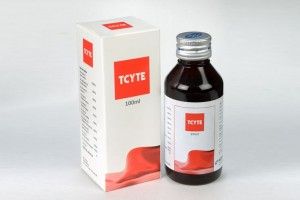Tcyte Syrup
Each 5ml contains:
| Ext. Papaya Leaf (Carica papaya) | 1200mg |
| Ext. Madhukparni Leaf (Centella asiatica) | 400mg |
| Ext. Aloe vera (Aloe vera) | 200mg |
| Ext. Anwla (Phyllanthus embica) | 200mg |
| Ext. Haritaki (Terminallia chebula) | 100mg |
| Ext. Gilloy (Tinospora cordifolia) | 100mg |
| Ext. Danamethi (Trigonella foenum-graceum) | 100mg |
| Ext. Punarnava (Boerhavia diffusa) | 100mg |
| Ext. Tulsi (Ocimum sanctum) | 100mg |
| Ext. Trikatu Pharmocopeal | 100mg |
| Syrup Base – qs. |
Thrombocytopenia
A common hematologic finding with variable clinical expression. A correct identification of the causes of thrombocytopenia is crucial for the appropriate management of these patients. However, platelet counts between 100 and150 x 109/L do not necessarily indicate disease if they have been stable for more than 6 months, and the adoption of a cut off value of 100 x109/L may be more appropriate to identify a pathologic condition. The relevance of thrombocytopenia in the individual patient is variable and depends on the clinical presentation.
The major mechanisms for a reduced platelet count are decreased production and increased destruction of platelets. Typical examples of the former are the Bone Marrow failure syndromes whereas increased destruction is seen in conditions such as disseminated intravascular coagulation (DIC) and the thrombotic microangiopathies.
Thrombocytopenia can be classified as emergent (usually requires inpatient management) or non-emergent (outpatient management). Some syndromes may fall in either category based on the severity of thrombocytopenia.
Infections may cause thrombocytopenia by direct bone marrow suppression or increased peripheral platelet consumption. Dengue is the most rapidly spreading mosquito-borne viral disease in the world. In the last 50 years, incidence has increased 30-fold with increasing geographic expansion to new countries and, in the present decade, from urban to rural settings. Dengue virus (DEN) is a small single-stranded RNA virus comprising four distinct serotypes (DEN-1 to -4).
Thrombocytopenia may be associated with alterations in megakaryocytopoieses by the infection of human haematopoietic cells and impaired progenitor cell growth, resulting in platelet dysfunction (platelet activation and aggregation), increased destruction or consumption (peripheral sequestration and consumption). Haemorrhage may be a consequence of the thrombocytopenia and associated platelet dysfunction or disseminated intravascular coagulation. In summary, a transient and reversible imbalance of inflammatory mediators, cytokines and chemokines occurs during severe dengue, probably driven by a high early viral burden, and leading to dysfunction of vascular endothelial cells, derangement of the haemocoagulation system then to plasma leakage, shock and bleeding.
For More information on Thrombocytopenia, Click Here.
Indications
Thrombocytopenia associated with
- Dengue, Malaria
- ITP and TTP
- Surgery
Suggested Dose
Adults & Children above 12 years (>35Kg) – 10ml twice a day
Children below 12 years 5ml twice a day
Presentation
Bottle of 100ml


